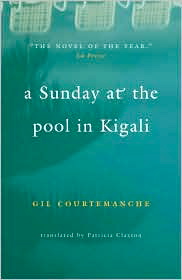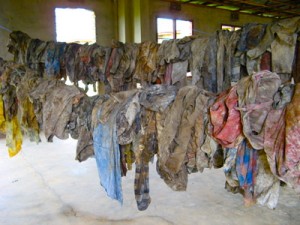“Millions of us are going to die. Of AIDS, of course, of malaria too, but most of all from a worse sickness for which there’s no condom or vaccine. This sickness is hate. In this country there are people who sow hate the way ignorant men [with AIDS] sow death.”
Every Sunda y afternoon, the pool at the Mille-Collines Hotel in Kigali, Rwanda, was a gathering spot for government workers, wealthy Rwandans engaged in various trades, aid workers, journalists, foreign visitors, and enterprising prostitutes, who gathered to drink, exchange news, gossip among themselves, and participate in the “vaguely surrealistic play being acted out at the pool.” The pool was, in many ways, a microcosm of life in Rwanda in the early, pre-war 1990s, illustrating the pressures and competing interests among various facets of society, all wanting to protect what they already had, at the very least, and, they hoped, to increase their power, influence, or wealth.
y afternoon, the pool at the Mille-Collines Hotel in Kigali, Rwanda, was a gathering spot for government workers, wealthy Rwandans engaged in various trades, aid workers, journalists, foreign visitors, and enterprising prostitutes, who gathered to drink, exchange news, gossip among themselves, and participate in the “vaguely surrealistic play being acted out at the pool.” The pool was, in many ways, a microcosm of life in Rwanda in the early, pre-war 1990s, illustrating the pressures and competing interests among various facets of society, all wanting to protect what they already had, at the very least, and, they hoped, to increase their power, influence, or wealth.
Through these people who visited the pool, all of whom were real and who are described with their real names, Gil Courtemanche, a former journalist in Rwanda himself, boldly illustrates the growing resentments and fears which tore apart the fabric of society and led to the genocide of almost a million Tutsi people in 1994. Using his own eyewitness stories and those distilled from over seven hundred pages of reports by the Africa Rights organization, he provides a setting seething with passions, revenge, greed, and all manner of corruption, within which a delicate love story, touching and unconventional–perhaps even improbable–manages to flourish.

This is not easy reading, however appealing the love story may be. Courtemanche exposes the corrupt government of Rwanda; the venal politicians who facilitate the illegal activities of their relatives and friends and help them set up monopolies; the self-serving Belgian security service, a leftover from the Belgian occupation; the public prosecutor, who refuses to listen to accusations against those in power; the Catholic church, which allows terrorist camps near its college because it fears confrontation; the Canadian general and the UN functionary who refuse permission to seize huge arms deposits destined for those bent on genocide; and the French, who not only sell arms to the terrorists but train them to be more efficient. Adding to the problems, the Rwandan government denies the AIDS problem, and hospitals find themselves with two or three persons to a bed, no antibiotics for weeks, and finally, not even an aspirin for patients.
Still, Courteman che finds beauty in the countryside and a sense of family and honor among ordinary citizens, and it is within this recognition of beauty that the love story flourishes. Bernard Valcourt, in his forties, is a Radio Canada producer who accepts the job of setting up a TV station in Rwanda for a Canadian international development agency. Gentille, working as a waitress at the hotel after completing her social service studies, is a beautiful young woman in her twenties, “so embarrassed by her beauty she has never smiled or spoken an unnecessary word,” and Valcourt has long admired her from afar. As the Hutu violence against the Tutsi minority begins, Gentille makes her first approach to Valcourt, begging him for help. A Hutu by birth, she has an identity card to prove it, but the intermarriages between Tutsis and Hutus within her family have left her looking like a Tutsi-tall, pale, and fine-featured. Because of the plethora of forged identity papers, government officials will not believe that she is who she says she is, and even Valcourt is somewhat disbelieving. Their love, as it eventually develops, is particularly poignant because neither can believe the other could possibly be truly in love. When at last they visit with Gentille’s family outside of Kigali, the genocide has started, and many of their friends have already been hacked to death, yet Valcourt is “able to say, without ifs, ands or buts, ‘I’m happy.'”
che finds beauty in the countryside and a sense of family and honor among ordinary citizens, and it is within this recognition of beauty that the love story flourishes. Bernard Valcourt, in his forties, is a Radio Canada producer who accepts the job of setting up a TV station in Rwanda for a Canadian international development agency. Gentille, working as a waitress at the hotel after completing her social service studies, is a beautiful young woman in her twenties, “so embarrassed by her beauty she has never smiled or spoken an unnecessary word,” and Valcourt has long admired her from afar. As the Hutu violence against the Tutsi minority begins, Gentille makes her first approach to Valcourt, begging him for help. A Hutu by birth, she has an identity card to prove it, but the intermarriages between Tutsis and Hutus within her family have left her looking like a Tutsi-tall, pale, and fine-featured. Because of the plethora of forged identity papers, government officials will not believe that she is who she says she is, and even Valcourt is somewhat disbelieving. Their love, as it eventually develops, is particularly poignant because neither can believe the other could possibly be truly in love. When at last they visit with Gentille’s family outside of Kigali, the genocide has started, and many of their friends have already been hacked to death, yet Valcourt is “able to say, without ifs, ands or buts, ‘I’m happy.'”

Courtemanche tells a powerful story which has received little attention in fiction. Through the story of Gentille’s ancestors, he traces the history of the Belgian occupation and the Tutsi/Hutu hatred. Through their friends, he shows the character of the Rwandan people in the city and in the countryside. Through the action, he portrays life at the hotel, life within the power structure of Kigali, and the role of foreigners in both ameliorating and exacerbating the inherent tensions and social problems, providing the reader with a full and vibrant picture of this complex society. The lyricism of his descriptions of nature contrast with the most profound horror of the genocide. The AIDS epidemic and its devastation, as seen in stories of Valcourt’s friends, add further darkness to this sad, continuing saga. Atrocity gains a human face here, and love takes on new meaning and value. Though some readers may question Valcourt’s actions at crucial moments near the end of the book, no one can question the author’s courage in telling this story and in naming names.
Notes: The author’s photo appears on http://www.yorku.ca
The pool at the Milles-Collines Hotel: http://www.millecollines.net
The clothes worn by genocide victims hang on blue clotheslines in a makeshift Rwanda Genocide Memorial. To those who have seen it, it has the same horrifying effect as the piles of shoes in the Holocaust Museum. http://www.pri.org
